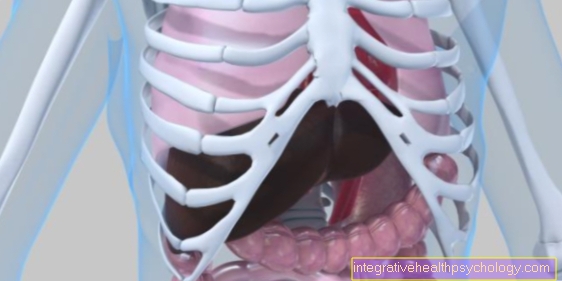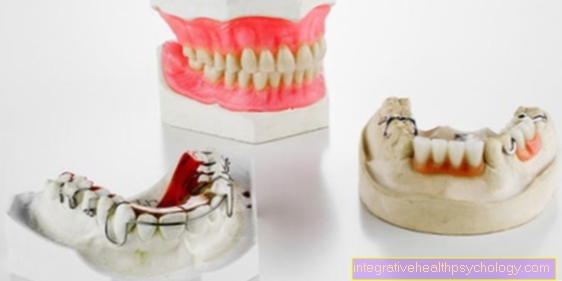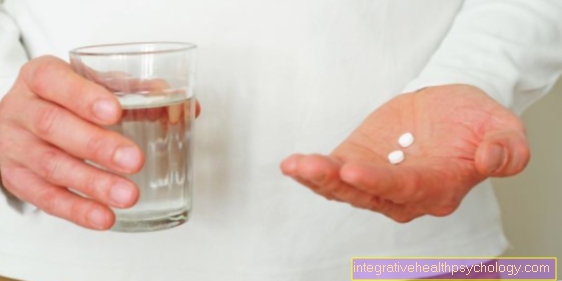Alcohol intolerance
introduction
Alcohol intolerance occurs when symptoms occur when consuming small amounts of alcohol that would otherwise only occur with higher amounts.
The degradation of ethanol or its degradation products slows down. The slower breakdown leads to the typical symptoms of alcohol intolerance. These consist of redness, swelling and stomach problems, to hangover symptoms that last for days, such as muscle, limb and headache.

causes
The cause of an alcohol intolerance is a disturbed breakdown of the ethanol. The breakdown of ethanol is brought about by two enzymes in the body. Changes in these enzymes lead to the degradation being disturbed. In some cases, the changes in these enzymes are genetic, especially in Asia, many people have an alcohol intolerance that is caused by a change at the genetic level.
Other causes of alcohol intolerance are organ damage, such as liver or kidney damage, which impair the breakdown and excretion of alcohol. In addition, certain drugs, such as antibiotics, can interfere with the breakdown of alcohol in the liver, which leads to reversible alcohol intolerance. Normally, ethanol is broken down into the toxic acetaldehyde via alcohol dehydrogenase. This is then broken down further by the aldehyde dehydrogenase into the non-toxic acetate, which is then excreted. However, if these enzymes are defective, alcohol can only be broken down more slowly. If the enzyme alcohol dehydrogenase is not fully functional, the ethanol is broken down more slowly and the blood alcohol level falls only very slowly. The more common cause, however, is a functionally impaired aldehyde dehydrogenase. The result is a high level of acetaldehyde. The toxic acetaldehyde is responsible for the typical “hangover” symptoms. High concentrations of this substance damage the organs.
Also read: Alcohol breakdown
Which test can be used to prove alcohol intolerance?
In many cases, alcohol intolerance is determined by the person concerned himself.
Even small amounts of alcohol lead to severe discomfort after drinking alcohol. The person concerned can then avoid the symptoms by not drinking alcoholic beverages. If you want to check whether there is a genetic alcohol intolerance, there is the possibility of DNA analysis. This examination method examines the part of the DNA on which the genes for the enzymes that break down alcohol are located. If the genetic variant of alcohol intolerance is present, changes can be found in the genes of alcohol or aldehyde dehydrogenase. Certain changes in the DNA segment are known which are responsible for a loss of function of the respective enzyme.
If there is an intolerance due to liver or kidney damage, it is necessary to examine the respective organs. For this purpose, the liver and kidney values can be determined by a blood test. Imaging methods can also be used. In the case of abnormalities, it is likely that a damaged organ is causing the alcohol intolerance.
Symptoms
The typical symptoms of alcohol intolerance are generally similar to the symptoms that occur in healthy people after consuming alcohol. In the case of alcohol intolerance, however, the symptoms occur even with significantly lower amounts of alcohol consumed and life-threatening poisoning can result. In addition, the "hangover" symptoms last for several days, depending on the extent of the intolerance.
Symptoms include circulatory problems caused by the blood vessel dilating effects of alcohol. To counteract this, the body reacts with an increase in heart rate, this increase is also known as tachycardia. So-called flush symptoms are also caused by the expansion of the blood vessels. This means that there is redness and swelling all over the body, especially the face. Another consequence of the expansion of the blood vessels is increased heat radiation, which is accompanied by a feeling of heat. Furthermore, if you are intolerant to alcohol, headaches can occur even with a small amount of alcohol consumed. Other symptoms that typically occur are nausea, stomach problems, and diarrhea. On the one hand, the nausea is triggered by stomach problems caused by increased acid production in the stomach, on the other hand, the nausea is triggered by the persistently high concentration of the toxins ethanol and acetaldehyde.
More information on this topic:
- Vomiting from alcohol
- Dizziness from alcohol
skin rash
A rash that occurs after consuming small amounts of alcohol can develop particularly when consuming beverages containing histamine, such as red wine.
A rash is a serious symptom of an allergy to certain components of the alcoholic beverage consumed and should definitely be clarified. A real allergy to ethanol, on the other hand, is very rare, but it could also manifest itself in a skin rash. An allergy to components of the alcohol consumed differs in the cause from an alcohol intolerance.
In the case of an allergy, the body classifies the respective components as dangerous and reacts by activating the immune system. An allergy can be particularly dangerous when swelling causes breathing problems.
Red stain
Red spots after consuming alcohol, combined with other symptoms, can be a sign of alcohol intolerance. The red spots that mostly appear on the face are caused by blood vessels that have been dilated by ethanol.
However, red spots also appear in healthy people after consuming alcohol. Usually, however, only after consuming very large amounts of alcohol.
More on this: Red spots on the face- causes and treatment
diarrhea
Diarrhea can generally result from the consumption of alcohol.
In the small intestine, alcohol affects the cells of the intestinal wall. An important function of the intestine is the absorption of water and salt. The effects of alcohol interfere with this process and leave more water in the stool. This leads to diarrhea after consuming alcohol. In addition, a small proportion of the alcohol itself remains in the intestine, which in turn binds water and thus also has a laxative effect.
Diarrhea can be an indication of alcohol intolerance, but this is usually not the only symptom. In addition, diarrhea can have many causes. Ingested food can also lead to diarrhea. However, if diarrhea occurs more often after consuming small amounts of alcohol, it is possible that there is an alcohol intolerance.
Read more about this: Diarrhea after consuming alcohol
Can you treat alcohol intolerance?
If the alcohol intolerance is genetic, it is not possible to treat the cause.
The altered genes that are responsible for restricting the functionality of the enzymes cannot be repaired. The only treatment option in this case is to abstain from alcohol. Affected people may not know that they have an alcohol intolerance. However, it is important to avoid alcohol or reduce consumption to a minimum if you are intolerant to alcohol. The reason for this is that even small amounts of alcohol cause greater damage to the organs.
However, if the alcohol intolerance is caused by organ damage, it may be possible to treat these organs. If it is possible to completely repair the organ damage, the alcohol intolerance may also be eliminated.
Often, however, the organ damage is caused by alcohol abuse. In this case, it is advisable to refrain from alcohol. This is difficult because organ damage caused by alcohol abuse is often associated with alcohol addiction, which makes it difficult to stop drinking. If drugs ensure that alcohol is poorly broken down, the intolerance is usually reversible. If the treatment with the appropriate medication is ended, the alcohol can often be broken down normally again. However, some medications must be taken permanently, with these it is important to refrain from alcohol.
You may also be interested in this topic: Alcohol addiction
forecast
If alcohol is consistently avoided in the case of alcohol intolerance, this does not reduce the life span.
In the western world, however, renouncing alcohol often represents a reduction in the quality of life, which is why renouncing it is more difficult than in cultures in which less or no alcohol is generally consumed.If alcohol is consumed in large quantities in the case of alcohol intolerance, the typical symptoms of alcohol intolerance occur.
It is important to emphasize that the symptoms can be life threatening. The increased stress caused by the rapid heartbeat can lead to problems, especially in the case of a previously damaged heart.
Also read: Consequences of alcohol
What is the role of the thyroid gland?
Some people who suffer from an underactive thyroid cannot tolerate alcohol.
So there is a decrease in tolerance to alcohol. On the other hand, alcohol, if consumed in moderation, can stimulate the metabolism. This effect is beneficial to a patient with an underactive thyroid, as metabolism is slowed down in this disease. If the hypofunction is corrected well, i.e. the hormones that the thyroid actually produces are supplied in the correct amount from outside, it is possible that the intolerance will decrease.
Similar topics: Alcohol addiction
What is the role of the liver?
The liver plays the most important role in detoxifying the body from alcohol, as the enzymes that break down alcohol are produced in the liver.
If the liver is damaged by excessive alcohol consumption, an unhealthy lifestyle or the use of medication, it can no longer produce the required enzymes in the required quantities.
Also read our article: Cirrhosis of the liver
Why do Asians suffer more often from alcohol intolerance?
The reason that Asians are more likely to suffer from alcohol intolerance is that in East Asian areas there is a genetic variant of the enzyme aldehyde dehydrogenase in a larger population group. This variant, which leads to alcohol intolerance, is very rare among other ethnic groups. However, the reason for the frequency of the gene variant is unknown.





























